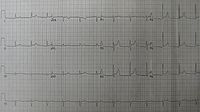
Photo from wikipedia
ABSTRACT Recurrent pericarditis (RP) is the most troublesome complication of acute pericarditis reflecting an unresolving inflammation of the pericardial sac around the heart and associated with significant morbidity. Recent studies… Click to show full abstract
ABSTRACT Recurrent pericarditis (RP) is the most troublesome complication of acute pericarditis reflecting an unresolving inflammation of the pericardial sac around the heart and associated with significant morbidity. Recent studies have shown interleukin-1 (IL-1) signaling to be central to the pathophysiology of cases of RP with evidence of activation of systemic inflammation. We herein review the literature and clinical trials discussing the utility of IL-1 blockade for RP. The early experience of IL-1 blockade with anakinra (Kineret) and its favorable safety profile paved the way for the clinical development of rilonacept (Arcalyst) and subsequent approval by the US FDA for RP. In patients with RP who have become colchicine-resistant and glucocorticoid-dependent, IL-1 blockade with rilonacept or anakinra effectively treats recurrences and prevents future flares, and significantly improves quality of life.
Journal Title: Journal of cardiovascular pharmacology
Year Published: 2023
Link to full text (if available)
Share on Social Media: Sign Up to like & get
recommendations!